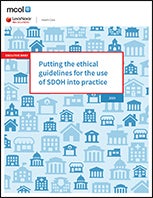Ethical Use of Social Determinants of Health Data
An eHealth Initiative Collaborative Project
The eHealth Initiative Foundation and the LexisNexis® Risk Solutions healthcare business convened multiple groups of cross-industry stakeholders to gather expert opinions on the use of social determinants of health (SDOH) data for the good of patients.
Medical care alone has a very limited effect on overall population health and could be significantly enhanced by pairing with approaches that address Social Determinants of Health. The results of those discussions are now summarized in The Guiding Principles for Ethical Use of Social Determinants of Health paper.
Our joint white paper provides a framework for the ethical use of this socioeconomic data. In addition, we held a joint webinar to provide guidance on how social determinants of health could be ethically used for care management within our healthcare system by providing the right interventions and services at the right time.

This document incorporates perspectives across the healthcare industry and provides critical insights on three key steps for using social determinants of health to predict barriers: SDOH predictive modeling, risk stratification and care management. Tailored, prioritized outreach efforts based on individual need that address the whole person and not just their medical condition are how health outcomes can improve, which can help to manage organizational costs. This brief addresses how social determinants of health can help achieve that outcome and improve overall public health.
The U.S. generally recognizes five overarching categories for social determinants—Economic Stability, Education, Social & Community Context, Health & Healthcare, Neighborhood & Built Environment. While the vast majority of U.S. healthcare dollars and efforts are spent on clinical factors, SDOH data give providers meaningful insights into socioeconomic and health disparities, helping to identify their most vulnerable patient populations. Integrating SDOH insights into care plans, healthcare stakeholders can recognize the need for, and enable access to, additional services or interventions for individuals. This includes programs related to food insecurity, reliable housing, or helping patients manage isolation and loneliness, which can improve overall well-being and health outcomes.
The move to value-based care models makes it imperative for providers and caregivers to have access to complete patient information, which enables care of the individual beyond the clinical condition. SDOH data can help, but it is important that as an industry we address ethical use and transparency. This executive brief outlines the ethical uses of social determinants of health data as agreed upon by all participating organizations.




